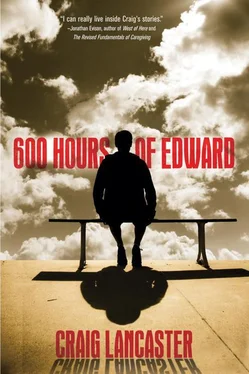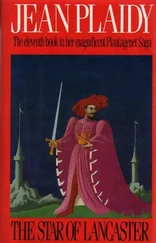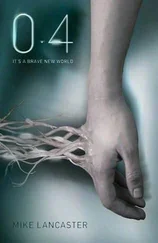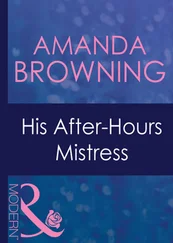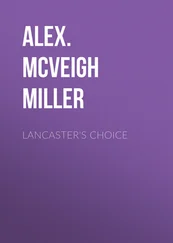“If you feel comfortable with that, Edward, I would love to.”
I lean forward in my chair and pull the folded letter out of my back pocket, then hand it to her.
Dr. Buckley gingerly unfolds the letter and starts reading, and I can’t be sure, but it looks like her eyes are getting teary.
After she stops reading, she looks for a while at the folded-up letter she still holds.
“Edward,” she finally says, “this is an extraordinary letter.”
“Yes.”
“I have patients who have waited all their lives to hear something like this from a parent, or a spouse, or a child.”
“Yes.”
“You should put this somewhere special. Don’t keep it folded up in your pocket.”
“Yes.”
She hands the letter back to me, and I hold it carefully.
“If I may, I think I can help you understand this feeling of peace you describe, Edward.”
“OK.”
“In the time we’ve been doing these sessions, what have been the constants in your life?”
“What do you mean?”
“The years change, the seasons change, the fashions change. What has remained the same?”
“I watch Dragnet every night.”
“Yes, you do, and strangely enough, I think that figures in. But what else?”
“I take my fluoxetine.”
“Yes. What else?”
“I complain about my father.”
“Yes. But it’s not just complaint. You’ve yearned for your father’s approval. You’ve wanted a better relationship with him.”
“Yes. But he’s dead now. I can’t have a better relationship with him now.”
“I disagree. Your father has given you a great gift with this letter. It allows you to have the relationship with him in death that you didn’t have when he was still alive.”
“How do you have a relationship in death?”
“It’s not a relationship in the way you’re thinking of. You don’t get to have coffee or share a conversation. But it’s in the way you feel about him—that you can have happy memories instead of sad ones. When someone asks you about your father, you can talk about what a warm, good man he was, not how he made you feel at times. That’s what he has given you. Do you understand what I’m saying?”
“I think so.”
“Think of it this way: When I ask what you’re thinking about your father, what do you say?”
“I miss him.”
“Why do you miss him?”
“Because I love him, and because I know he cared about me.”
“How do you know?”
“Because he told me.”
“Exactly. That’s the gift.”
Dr. Buckley is a very logical woman. She knows how to look at things in just the right way.
“I get it,” I say. “Now, tell me about how Dragnet figures in.”
– • –
Dr. Buckley is right: Dragnet does figure in.
She asks me when I started watching Dragnet . It was 1994. I was changing channels and came across it on the TV Land network. I was immediately struck by Sergeant Joe Friday. Even though he is fictitious, he is the only person I’ve ever known who cares about facts as much as I do. Sergeant Joe Friday isn’t interested in anything except the facts. That’s the way I am.
But Dr. Buckley explains that it’s more than that. As my relationship with my father deteriorated, culminating with the “Garth Brooks incident,” my relationship with the fictitious Sergeant Joe Friday intensified. I began to see in him something virtuous, a quality I no longer saw in my father. That’s what Dr. Buckley says.
“Sergeant Friday perhaps became your father figure,” Dr. Buckley says.
That seems strange to me.
“But Sergeant Joe Friday never married,” I say. “He didn’t have any children.”
“He’s also not real,” Dr. Buckley says. “That’s why he’s a symbol. He’s not the real thing. Your father was.”
“Are you saying I spend too much time with Dragnet ?” It seems impossible to me that anyone could, but if Dr. Buckley says so, I might have to consider it. Dr. Buckley is a very logical woman.
“No, not at all,” she says. “Believe me, there are far worse ways you could spend a half hour a day. Watch Dragnet all you like. But you have a father. Maybe you could just let Sergeant Joe Friday catch the bad guys. That’s his job.”
Dr. Buckley is a very logical woman.
– • –
Finally, we talk about Donna Middleton. I tell Dr. Buckley about the memorandum of understanding that my father made me sign, about how I pushed Donna away when she tried to talk to me about my father’s death, about the episode out on my front lawn Sunday when I yelled at Donna and Kyle.
“You’ve not told her about the document you signed?” Dr. Buckley asks.
“No.”
“Can you understand, then, how she might be confused about your actions toward her?”
“Yes.”
I then tell Dr. Buckley that my mother fixed it with Jay L. Lamb where the memorandum of understanding is no longer in force and that my mother is proud of me for having a friend.
“But I don’t know what to think,” I say. “I saw Donna getting into her car this morning, and I’m pretty sure she saw me, too. I waved at her, but she just stood there for a few seconds, then got in the car and drove away.”
“You’re not sending her a very clear signal, Edward. First, you’re her friend and you go to court with her. Then you’re not her friend and you push her away. Then you yell at her little boy. Then you wave at her. What do you expect her to think?”
“I don’t know.”
“I want you to consider something. Your friend’s feelings are probably hurt, and given what she has been through in her life, she may be asking herself whether she can trust you.”
“She can.”
“Yes, but you can’t be the one who convinces her of that now, not after all of this. I think you need to give her some space. I think you need to prepare yourself for the possibility that she won’t be your friend. Do you think you can do that?”
“Yes,” I say. I am sad. “I don’t want to, but if Donna Middleton doesn’t want to be my friend, I will accept that.”
“Good. We’ll talk about this more.”
– • –
“It’s been quite a week for you, Edward,” Dr. Buckley says. “What are you going to do now?”
“I don’t know. Go back to the things I’ve always done. Find a new project.”
“Anything else?”
“No, I don’t think so.”
“I’m going to be frank with you here.”
Dr. Buckley has said this a few times in the years that I have been talking with her. What she has to say usually stings, but later, I find out she was right.
“OK.”
“I don’t know what you’re waiting on.”
“What do you mean?”
“Edward, do you know how long life lasts?”
“It depends.”
“Yes, but let’s just say you live a nice long life by conventional standards. Do you know how long that lasts?”
“I don’t know. I read somewhere once that men live about seventy-two years.”
“That’s about right. Put another way, a full, long life is about 650,000 hours. What do you think when you hear that number?”
“Can I borrow a calculator?”
Dr. Buckley stands up and goes to her desk, and then she brings a pocket calculator back to me.
I check her math: 24 hours a day x 365 days a year x 72 years = 630,270.
“It’s 630,270 hours,” I say.
“So even fewer than 650,000.”
I punch up the numbers again, just to double-check my math. Of course, there will be some leap years in there, so it’s not exactly 630,270 hours, but it’s close enough. It’s hard to know how many leap years there are unless you know the first year, and I don’t. This is a hypothetical situation.
Читать дальше
